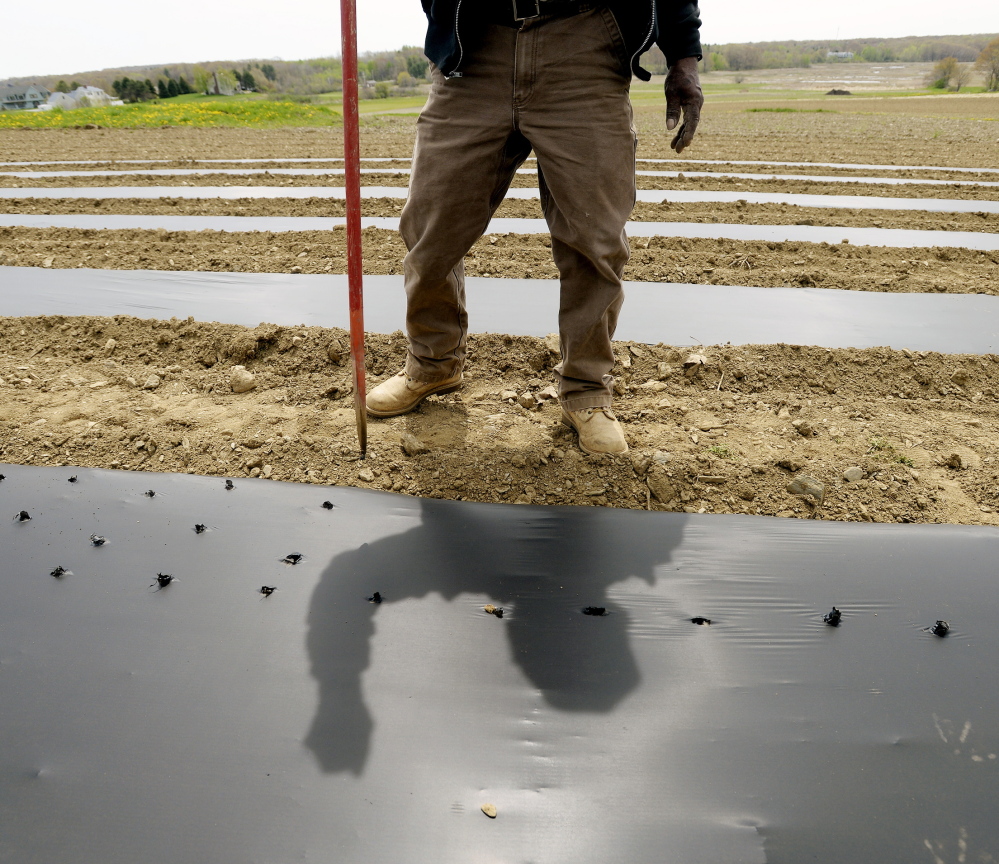Despite above-normal snowfall last winter, much of New England is experiencing a drier than normal spring.
The National Weather Service has classified it as a moderate drought, which means precipitation is slightly below normal. That’s a far cry from what’s happening in most of the West, which is in the grip of a years-long drought classified as “exceptional,” the most severe category, by the weather service.
Even with Thursday’s downpours, Portland is running below normal for rainfall, said James Brown, a meteorologist with the weather service in Gray. He said Portland has received 15.66 inches of precipitation since Jan. 1, but normally gets 18.94 inches through May 29.
Most of that deficit occurred in May, with only 1.36 inches of rain falling through Friday, Brown said. Normal for the month through May 29 is 3.75 inches.
Areas to the south are getting less rainfall.
In Boston, which set a snowfall record last winter, rain since March 1 is just 52 percent of normal, the weather service said. In New York City, rainfall is 58 percent of normal and in Providence, Rhode Island, it’s 60 percent.
There were heavy downpours in Maine on Thursday, Brown said, but the amount of rain that fell varied widely. Officially, Portland got 0.37 inches, Gorham recorded 0.68 inches and in Gray, at the weather service offices, 0.61 inches fell. In New Sharon, near Skowhegan, 1.34 inches of rain fell, he said.
And the forecast calls for more showers this weekend and normal rainfall over the next six to 10 days, Brown said, so the region’s dryness might ease somewhat, calming those worried their wells might run dry.
All that snow this past winter wasn’t especially significant in terms of moisture, largely because it was so cold, Brown said. The storms may have dumped 20 inches of snow or more, but the moisture content was no more than a lighter snowfall. When those 4-foot piles of snow finally melted, there wasn’t a large amount of moisture that went into the ground to recharge water levels, he said.
The lack of rain – at least at this stage of the season – may prove beneficial to farmers.
The timing means that farmers can get their crops started without slogging through mud that can often delay the planting season.
“It’s making it possible to get a lot more things done, because we haven’t been having a lot of rainfall,” said Dr. Mark Hutton, a vegetable specialist at the University of Maine. “Field work, field preparation, have not been delayed, as they usually are by rain.”
But the lack of rain is “a double-edged sword,” Hutton said. Farmers are “not being delayed because of excessive moisture, but they’re having to spend time irrigating crops.”
Below-normal rainfall carries benefits beyond somewhat easing farmer’s workloads, said Dr. Rene Moran, a fruit tree specialist at the University of Maine.
“We have applied fewer fungicide sprays and we’re expecting fewer diseases this year” because of the drier weather, Moran said. “The other benefit would be that I expect to have less hail damage. This is the time of the year when we get hailstorms.”
But Moran said the downside is greatest for new farmers or those who have planted new trees this year.
“Newly planted trees are very vulnerable to dry weather,” she said. “This means that growers have to spend extra time and money installing irrigation.”
However, Moran said, “Growers are not talking about it that much, so it’s not as bad as the last drought, which I think was 2002-3.”
Both Hutton and Moran said that if the dryness persists into the summer, it could be a bigger problem, particularly for farmers without access to rivers or ponds for irrigation.
Joel Gilbert, who has a farm just south of Livermore, said he has managed to keep his fruit trees and row crops well-watered so far.
“It’s definitely been dry … (but) everything on our farm is irrigated, so we’re actually finding that we’re able to keep up with it,” he said.
In addition to less of a threat from diseases – an infection called apple scab is easier to control this year because of the dry conditions and there is less mold on his berries – Gilbert welcomes a break from the typically wet conditions of spring.
“For the past several years, we’ve been dealing with torrential rains around this time,” he said. “I think it’s nice not to have so much mud and ruts on our farm. It’s nice to be out on hard ground, though we do hope to see some rain, which will keep our water reservoir up. If, as the season progresses, it stays dry, if the irrigation ponds do not have reserve enough, we will be in trouble.”
However, Gilbert said that while rainfall in Maine may be inconsistent from month-to-month, he can rely on it over the long haul.
“Here in Maine, that water is such an abundant resource that we’re tapping into it and it’s keeping us alive,” he said.
Press Herald Correspondent Sam Norman contributed to this report.
Copy the Story LinkSend questions/comments to the editors.




Success. Please wait for the page to reload. If the page does not reload within 5 seconds, please refresh the page.
Enter your email and password to access comments.
Hi, to comment on stories you must . This profile is in addition to your subscription and website login.
Already have a commenting profile? .
Invalid username/password.
Please check your email to confirm and complete your registration.
Only subscribers are eligible to post comments. Please subscribe or login first for digital access. Here’s why.
Use the form below to reset your password. When you've submitted your account email, we will send an email with a reset code.